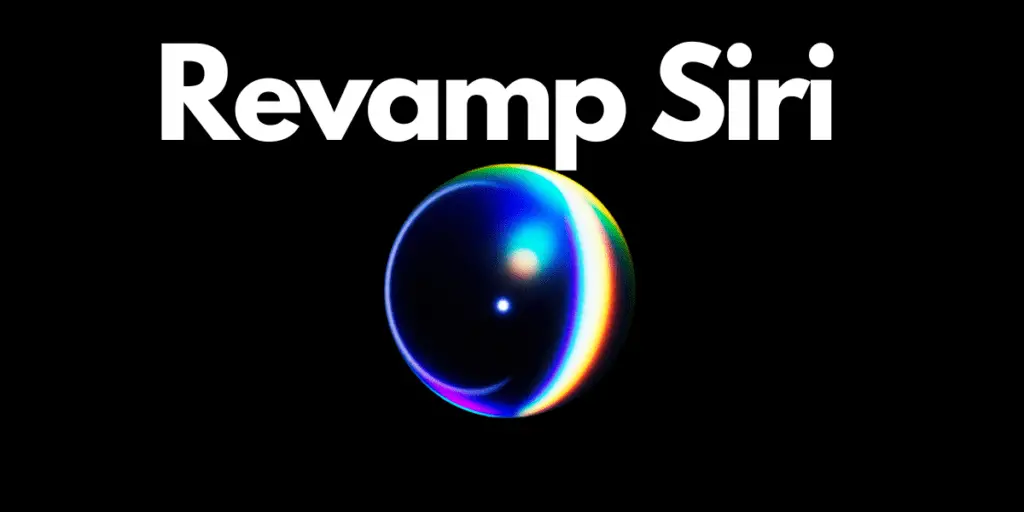Apple is taking steps to revamp Siri, introduced in 2011, Siri was among the first virtual assistants integrated into a smartphone, setting a precedent for AI-driven personal assistance.
As competitors have introduced more advanced AI technologies, Siri has increasingly been perceived as needing to catch up, limited by its inability to maintain conversations and understand complex contexts.
Recognizing these challenges, Apple’s top executives were influenced by their experiences with advanced AI models like OpenAI’s ChatGPT, and Siri Revamped AI assistant.
Siri and Its Limitations
Siri, launched in 2011 as a feature of the iPhone 4S, represented a significant innovation in personal technology, offering users a voice-activated assistant that could perform tasks, set reminders, and search the internet through simple voice commands.
As the first mainstream virtual assistant integrated directly into a smartphone, Siri promised a new era of hands-free interaction and digital management.
Despite its early promise, Siri’s development over the years has not kept pace with the rapid advancements in AI technology. Fundamental limitations have become apparent:
Siri’s initial programming was not designed for multi-turn conversations. It handled single, isolated requests effectively but struggled to maintain context or follow through in an extended interaction.
This limitation became more pronounced as competitors introduced AI that could handle more dynamic and contextually rich conversations.

Siri often needed clarification or could not interpret the context of queries correctly, leading to responses that did not match user expectations.
This was partly due to its reliance on more rigid programming and less sophisticated natural language processing technologies compared to newer AI systems.
Apple’s Motivation
The landscape of AI-powered virtual assistants has evolved rapidly, with players like Google Assistant and Amazon Alexa and emerging technologies like OpenAI’s ChatGPT demonstrating more advanced conversational capabilities and integration.
These advancements have set new expectations for what a virtual assistant can do, exposing Siri’s inability to keep pace.
Apple’s executives, including Craig Federighi and John Giannandrea, recognized that generative AI technology had significantly advanced since Siri’s last major update.
Their experience with newer AI models, which could seamlessly handle complex interactions and generate human-like responses, highlighted Siri’s outdated technology and functionality.
There is a growing concern among Apple’s leadership that advancements in AI could potentially disrupt the smartphone market.
If competitors develop more advanced AI systems that become central to mobile operating systems, they could threaten iOS’s dominance.
This possibility has spurred Apple to update Siri and consider integrating other advanced AI technologies to maintain its competitive edge.
Apple has initiated one of its most significant organizational changes in a decade, recognising the need for a drastic upgrade.
This includes shifting resources, like those from its autonomous car project, to focus on developing a more robust AI framework. This strategic pivot reflects the company’s recognition of AI’s critical role in shaping future technologies.
In alignment with its longstanding commitment to user privacy, Apple plans to enhance Siri to process more data directly on devices rather than relying on cloud-based servers.
This approach addresses privacy concerns and reduces operational costs, differentiating Siri from other AI services that depend heavily on cloud computing.
With over two billion devices in active use, Apple has a unique opportunity to leverage its vast hardware ecosystem to distribute advanced AI capabilities.
Siri Revamped
Apple’s revamp of Siri involves significant technical enhancements designed to make the virtual assistant more conversational, context-aware, and capable of handling a broader range of tasks.
The new Siri’s core is a shift to generative artificial intelligence. This technology allows Siri to generate responses and perform tasks based on a broader understanding of language and context rather than merely reacting to specific commands.
This shift will enable Siri to converse over multiple exchanges, understand indirect requests, and anticipate user needs based on prior interactions.
The updated Siri will likely utilize advanced language models more capable of processing natural language.
These models are trained on vast datasets and can understand and generate human-like text, making interactions with Siri more fluid and natural.
A significant shift for Siri is the move towards more on-device processing. This change addresses privacy concerns, as data must not be sent to external servers for processing.
It reduces latency and dependency on network connectivity, allowing for faster and more reliable responses.
Apple has reportedly increased the memory of new iPhones to support Siri’s new capabilities. This upgrade will accommodate the larger, more complex AI models needed for on-device processing.
One of the challenges with smaller, on-device AI systems is the increased likelihood of errors, often referred to as “hallucinations” in AI parlance.

Apple is addressing this by enhancing the algorithms to reduce error rates and improve the reliability of Siri’s responses. This involves sophisticated testing and tuning to balance performance and accuracy.
The new Siri is expected to be more deeply integrated with the broader iOS ecosystem. This means better interoperability with third-party apps and Apple’s own suite of applications, from Calendar and Notes to Reminders and Messages.
The goal is to create a more seamless experience where Siri can act as a more integral part of the user interface.
Apple’s leading semiconductor team, known for designing custom chips, plays a crucial role in powering the new Siri.
These chips are optimized for AI tasks, such as speech recognition and natural language processing, enhancing the efficiency and performance of AI operations on Apple devices.
Apple’s Competitive Edge
As Apple embarks on its ambitious project to revamp Siri, the company leverages several unique strengths and strategic advantages that could help it maintain and enhance its position in the competitive landscape of AI-driven technologies.
Apple controls its devices’ hardware and software, allowing for seamless integration of new technologies.
This integration enables optimized performance and enhanced user experiences, which competitors who rely on a more fragmented ecosystem of hardware providers find difficult to replicate.
Apple has consistently prioritized user privacy, a stance that increasingly appeals to consumers in an era of rampant data breaches and privacy concerns.
By processing more AI tasks on-device, Apple ensures that personal data doesn’t leave the user’s device, reinforcing its commitment to privacy and potentially attracting privacy-conscious consumers.
Apple’s in-house semiconductor capabilities give it a significant advantage. The company has developed some of the most advanced chips in the consumer electronics industry, capable of handling intensive AI tasks efficiently.
This technological prowess supports more powerful AI features without compromising battery life or device performance.
With over two billion devices in active use globally, Apple has a vast platform to deploy its AI innovations quickly across a broad user base.
This extensive reach allows for immediate and widespread adoption of new features, enhancing the stickiness of Apple’s ecosystem and encouraging user loyalty.
Apple’s substantial investment in R&D allows it to continuously innovate and improve its products and services.
By redirecting resources from other projects, such as the autonomous car initiative, to AI development, Apple is doubling its commitment to leading in the AI space.
Apple’s brand is synonymous with quality and innovation, positioning it well to introduce new technologies to its user base.
The trust and brand loyalty Apple has cultivated over the years provide a solid foundation for rolling out new AI features and ensuring user acceptance.
Apple has made strategic acquisitions in AI and is reportedly considering licensing additional AI technologies from leading firms.
Future Prospects
As Apple embarks on its significant revamp of Siri, the company is aligning its future strategy with the broader trends and demands of the AI-driven technology landscape.
Apple’s strategy emphasizes the integration of more advanced AI into Siri, transforming it from a simple voice assistant to a more robust, conversational AI that can manage complex interactions.
This will improve user experience, and Apple’s technology remains at the forefront of the AI revolution.
Apple is positioning itself as a leader in privacy-focused AI solutions by prioritising on-device processing for AI tasks.
This approach addresses consumer privacy concerns and differentiates Apple from competitors who rely heavily on cloud-based AI, which can be more vulnerable to privacy breaches.

Apple’s decision to reallocate resources from other projects, such as the autonomous vehicle initiative, to AI development reflects a strategic prioritization of AI as a critical growth area.
This move indicates Apple’s recognition of AI’s transformative potential across all its products and services.
Future strategies include more profound integration of Siri’s AI capabilities across Apple’s suite of products, from iPhones to Macs to HomePods.
This cross-platform integration aims to create a seamless user experience, increasing the utility of Apple devices and encouraging a more integrated use of the Apple ecosystem.
With the revamped Siri, Apple aims to solidify its position in the smart device market.
Improved AI capabilities could enhance the appeal of Apple’s broader product line, including wearables and home technology, by offering more sophisticated, context-aware interactions.
Enhanced AI capabilities may also open new market opportunities for Apple, including more personalized services, AI-driven health and wellness features, and intelligent home automation solutions.
These innovations could lead to new revenue streams and strengthen Apple’s market position.
Apple will likely continue its heavy research and development investment, focusing on AI and machine learning.
Final Thoughts
Apple’s strategic revamp of Siri signifies a bold response to the evolving landscape of artificial intelligence in consumer technology.
By integrating advanced generative AI capabilities, Apple aims to enhance Siri’s functionality and fundamentally transform users’ interactions with their devices.
This overhaul, driven by the need to keep pace with competitors and meet growing consumer expectations for more intelligent, context-aware technology, is a testament to Apple’s commitment to innovation and excellence.
The upcoming enhancements to Siri are set to position Apple advantageously against competitors by leveraging its strengths in hardware integration, privacy, and a seamless ecosystem experience.
These changes are anticipated to improve user satisfaction, reinforce customer loyalty, and attract new users seeking cutting-edge technology in their personal and professional lives.
As Apple gears up to unveil these changes at its Worldwide Developers Conference, the technology community and consumers are eagerly awaiting their arrival.
If successful, this initiative could redefine the standard for virtual assistants and secure Apple’s leadership in AI, further cementing its role as a pioneer in integrating technology with daily life.
This is a critical moment for Apple as it adapts to the shifting paradigms of technology, focusing on AI’s potential to drive future innovations and redefine user interactions in the digital age.


